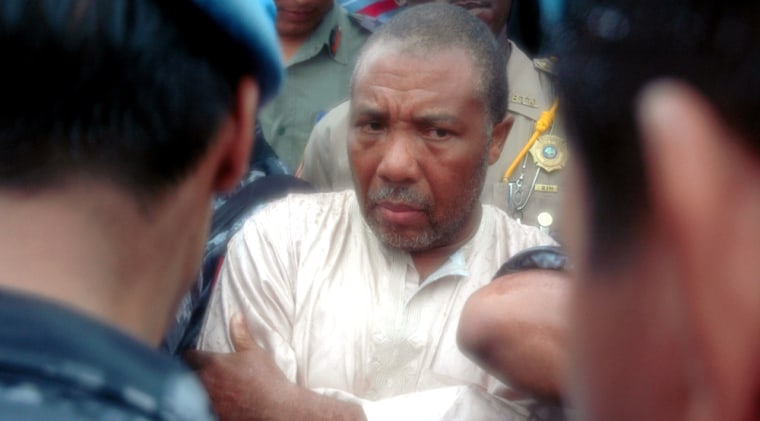Former Liberian President Charles Taylor pleaded not guilty Monday before an international war crimes tribunal, denying 11 counts of helping destabilize West Africa through killings, sexual slavery and sending children into combat.
Taylor at first told the court he could not enter a plea because he did not recognize its right to try him. But he went on to tell Justice Richard Lussick “I did not and could not have” committed the atrocities that allegedly occurred during Sierra Leone’s civil war.
The court accepted his comment as a formal plea of not guilty.
Taylor, wearing a dark suit and maroon tie, spoke calmly and slowly.
Taylor is the first former African president to face war crimes charges. He was brought to Sierra Leone last week after briefly escaping custody in Nigeria, where he was staying since 2003 under a deal to end Liberia’s civil war.
Security was tight at the Special Court in Sierra Leone, the country to which Taylor is accused of exporting his civil war. Court officials who received death threats and Taylor will be protected by bulletproof glass and dozens of U.N. peacekeepers from Mongolia and Ireland.
Taylor showed little emotion as a court official, Krystal Thompson of the United States, read the indictment. He sat at a table, flanked by two security officers. When the official read “murder, a crime against humanity,” he laced his fingers on the table before him.
Taylor met with his lawyers for the first time Monday morning shortly before his court appearance. Two lawyers from Liberia and two from Ghana “gave him our advice and he will consider it. We consider our mission accomplished,” said Kofi Akainyah, a Ghanian member of the team.
Nigerian intrigue
Many were suspicious when Nigeria’s government announced Taylor’s disappearance last week, just days after Nigerian President Olusegun Obasanjo reluctantly agreed to hand him over from the exile haven he had been offered under an internationally brokered peace agreement ending Liberia’s 14-year civil war.
But Taylor’s spiritual adviser said Nigerian security forces encouraged Taylor to flee and helped him get to the Cameroon border before turning around and arresting him in a double-cross.
Indian evangelist Kilari Anand Paul said Taylor told him in a phone call from jail Saturday that State Security Service agents in two vehicles came to his villa in southeastern Nigeria the night of March 28.
Taylor said they escorted him north, then released him “in the middle of nowhere,” Paul said from his home in Houston. “He said, ‘Where are you guys going?’ And they said they received instructions to leave him and they left.”
Before Taylor could cross into Cameroon, the agents who had freed him “turned up and arrested him ... they had guns and told him to surrender himself,” said Paul, who met Taylor in 2003 and says he helped broker Taylor’s exile to Nigeria.
Nigeria again denied the allegation.
“The story is a far-fetched figment of his jaundiced imagination,” Obasanjo spokesman Femi Fani-Kayode told The Associated Press. “He must have been reading too many James Bond novels.”
For two days, Nigeria had resisted calls from the United States, human rights organizations and others to arrest Taylor to ensure that he would stand trial. He was arrested Wednesday in northern Nigeria and taken to the war tribunal in Sierra Leone, established to try those seen as bearing greatest responsibility for atrocities during Sierra Leone’s 1991-2002 civil war.
Call for representation
Principal court defender Vincent Nmehielle said he had received calls from lawyers from all over the world wanting to represent Taylor. He also said the indicted Liberian warlord had told him he wanted time to get together a top-notch team and was happy to be represented by Nmehielle at Monday’s hearing.
Nmehielle said Taylor asked his office to contact two lawyers he wanted on his defense team: Harvard law professor Alan Dershowitz and British lawyer Karim Khan, who represented Taylor when he challenged the jurisdiction of the war tribunal in 2003.
Taylor had earlier asked Paul to contact lawyers in the United States and Britain, saying: “Bring two attorneys. Bring them any way you can. I need somebody to take charge of this defense immediately ... (I need) to put things into motion because we have only 30 days to answer the indictment.”
Paul included an AP reporter in Sunday’s conference call with Taylor, who spoke from his cell at the tribunal. The reporter was not allowed to ask questions for fear prison authorities would disconnect the call.
Diamond deal alleged
At the war crimes tribunal, Taylor is accused of backing Sierra Leonean rebels notorious for maiming civilians by chopping off their arms, legs, ears and lips. In return for supporting them, he allegedly got a share of Sierra Leone’s diamond wealth and used it to fund his ambitions in Liberia.
The leader of Taylor’s defense team, Francis Garlawulo, said Taylor was president when indicted in 2003 and argued the U.N.-backed court had no jurisdiction over Liberia or its head of state. The court’s appeals chamber rejected a similar argument made by a Taylor lawyer after the indictment was filed.
Garlawulo also questioned whether Taylor could receive a fair trial given intense publicity surrounding the case, saying in recent days images of Sierra Leoneans maimed by rebel fighters have dominated the world’s television screens.
Although Taylor made his first court appearance in Sierra Leone, Special Court officials have requested that an international court in The Hague, Netherlands, host the trial. Liberian President Ellen Johnson Sirleaf has expressed fear that Taylor supporters could use the trial as an excuse to mount another insurgency in her country.
